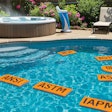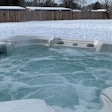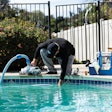
When homeowners purchase a new hot tub or swimming pool, most don't drool over filter media. Many prefer to dream of idyllic days spent leisurely floating on a comfortable raft or of the pleasant sensation of cool breezes on their faces while their cares are drummed away by pulsing hydrotherapy.
But as worries drift away, body oils, tanning lotion and various debris are floating toward the filter, where bacteria can attach and live a long and happy life of their own — until recently.
Antimicrobial media, which is coated on the cartridge filter or built-in to the fibers of the filter, help suppress bacterial growth in and on filters that can lead to dirty and clogged cartridges.
About Antimicrobial
"Filters in general in our industry are somewhat overlooked as far as their importance," says Jeff Kurth, a partner with Essentials, based in Cumming, Ga. "In selling hot tubs, really the water is key — the clarity and the quality of water is the real key to people enjoying the hot tub experience, and the filtration and the filter element are a very key part in maintaining good, clean, quality water.
"If there is anywhere in the spa the bacteria is going to grow, where is it going to be. It's going to be in the filter because all the water is passing through the filter."
Despite the importance of filtration and filter media, it hasn't changed much in the past 30 years, says Dino Abelli, director of liquid and respiratory products for Hollingsworth and Vose, East Walpole, Mass. "The standard product that has dominated the industry has been a traditional spunbond polyester. It has worked well and is a good product for basic filtration.
"What I wanted to do when I came to Hollingsworth and Vose about six years ago was to see what we could do to get into this market, which was — and still is — dominated by polyester spunbond. In order for us to penetrate and make an impact in this market I thought we had to come up with something new and innovative to distinguish ourselves from the current product that was out there."
In 2000, Hollingsworth and Vose introduced AquaSure Ag, a carded cartridge filter media that includes built-in Fosshield antimicrobial technology, which "inhibits the growth of destructive and odor-causing bacteria in fibers and textile products using bicomponent fiber technology to deliver metallic ion antimicrobial compounds," according to information from Foss Manufacturing Company, a Hampton, N.H.-based company that provides specialty fibers for applications in the filtration market.
In other words, the Fosshield Fiber Ag is made with a silver ion compound, which is continuously active against bacteria and prohibits the growth of mold, mildew and odorcausing bacteria on the surface of the filter.
Two years ago BBA Filtration, Old Hickory, Tenn., introduced its Reemay Advantage with Microban antimicrobial protection. According to Microban International, a leader in built-in antimicrobial product protection, when microbes come in contact with the product surface, Microban protection penetrates the cell wall of the microorganism and disrupts cell functions, making the microorganism unable to function, grow and reproduce.
Without any antimicrobial activity in filter media, contaminants can continue to grow on the filter, says Abelli. The bacteria end up clogging the filter and there's potential for it to release back into the water. However, he says, when the organisms are trapped on a filter that features antimicrobial activity, they are suppressed. The filter is protected, it doesn't clog as much and homeowners end up with a cleaner filtration system, he says.
Is Built-In Better?
Although most antimicrobials prevent most bacteria from building on the filter media, not all are created equal, according to Kurth.
"There are certain filter elements where they'll put a coating over the polyester elements, either soaked or sprayed on," he says. Kurth believes filter media that features an antimicrobial coating runs the risk of being applied unevenly and eventually wearing off, whereas when it's built into the polyester material and embedded in the pleats, this risk is much lower, if not negligible.
Abelli uses denim as an analogy. "You've got that dye and coating in your blue jeans, but you wash them a few times and they don't stay blue anymore. [The dye] starts to wash off," he says. "With a coating on top, as this [cartridge] is constantly wet with water flowing through it, there is going to be erosion of that coating on the material."
He says with a built-in antimicrobial being an integral part of the fiber, it is constantly available at the surface of the pleat and doesn't wash off. He also says Hollingsworth and Vose sent cartridges to Foss Manufacturing, which produces the substrate used in the cartridges, for productivity testing. "They ran 1.5 million gallons of water through this stuff and saw no erosion or loss of the antimicrobial activity," he says.
A Proven Necessity
Although nobody will deny having extra protection for filters is beneficial in commercial applications, some industry members might question the necessity of this product in a residential setting.
However, Abelli says, "Even with just a little bacteria that gets in there, even if it's just once a day, [a hot tub] is a breeding ground. That protection that you have on the filter is going to be a benefit."
Rick Pearce, senior director of business marketing for North Charleston, N.C.-based Polymer Group, says manufacturers are being pressured by dealers to provide both standard and antimicrobial filters in their product lines. And because dealers can market the antimicrobial filter as a premium filter, they can sell it for approximately 15 percent more.
He attributes this to homeowners wanting to do anything they can to keep the water in their pool or hot tub as clean as possible. However, he worries that some dealers and homeowners will believe the antimicrobial filter will allow them to reduce the amount of chemicals they use.
"I'm afraid that some people feel the antimicrobial does more than it really does," he says. "It's an added benefit on the filter, but it's not a replacement. You can't run the water through it and kill all the bacteria in the whole system."
Abelli agrees. "The use of an antimicrobial filter does not, I repeat, does not mean that people can get away with not putting chemicals into their pool or spa," he says. Although he says homeowners don't have to do anything more to clean the filter, they do have to follow the standard cleaning recommendations of the unit's manufacturer. However, he says, "All indications are that by adhering to those, the filter that they are going to have to clean is not going to be as dirty as what they would normally see."
"They do need to clean that filter every 30 to 60 days depending on bather load," adds Kurth. And not by just hosing it off, he says, but by deep cleaning or soaking it. He also recommends homeowners have two filters on hand, so while one is being cleaned the other can be used in the spa to maintain water quality.
According to Peter Angelini, senior development engineer for BBA Filtration, the Environmental Protection Agency regulates claims manufacturers can make regarding antimicrobial products. Dealer and homeowner education from manufacturers can also help to prevent any misconceptions.
The Future For Fiber
"We have barely scratched the surface of potential applications for antimicrobial fibers in filtration," says Konstantin Goranov, director of fiber research for Foss Manufacturing. "The prevailing opinion among the experts in the filtration industry at Filtration 2004 (a trade show held Dec. 8-9 in Philadelphia) was that antimicrobial media will experience the fastest growth in the marketplace in the next five years."
Goranov also says he believes it is only a matter of time before customer demand makes antimicrobial filters a standard feature in hot tubs and pools. Furthermore, he says, the filters will still have to be replaced on a regular basis, which could mean an increase in after-market demand.
Although antimicrobial technology is fairly new in the pool and spa industry, the high interest among consumers and dealers is prompting some companies to introduce new and improved products.
Essentials recently introduced its line of Great Barrier filtration products. The Great Barrier features Reemay Advantage spunbond polyester pleats with Microban antimicrobial protection.
Angelini says BBA Filtration will soon offer a new product called Reemay Freedom, which combines advanced antimicrobial technology with easier-to-clean media. And Foss Manufacturing says it is completing bioefficacy tests for Fosshield CS, its most advanced antimicrobial technology to date. Fosshield CS combines the active ingredients of copper and silver, which Goranov says are proven to be powerful against a broad spectrum of mold, fungus and mildew.
Kurth believes the introduction of this new antimicrobial technology can only lead to industry growth and consumer happiness.
"Really, it's all about the water — the whole hot tub experience. The quality of the water. That's what we're soaking in, so you want to do everything possible to ensure you have the best quality water that you possibly can have," he says. "By inhibiting the growth of bacteria, it's going to add another level of protection that a standard element would not. So for a very minimal charge of $5 to $10 [for the homeowner], why wouldn't you want to ensure you have the most protection available.
"And from a dealer standpoint, because it's fairly new, I believe it offers additional profit opportunities and I believe there is a real opportunity out there for the industry to sell more filters, which is going to make them more money, but even more importantly, it's going to ensure that the consumer has a good experience when enjoying and utilizing their hot tub."











































